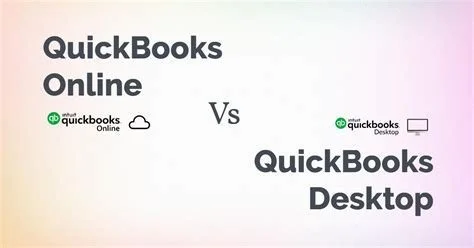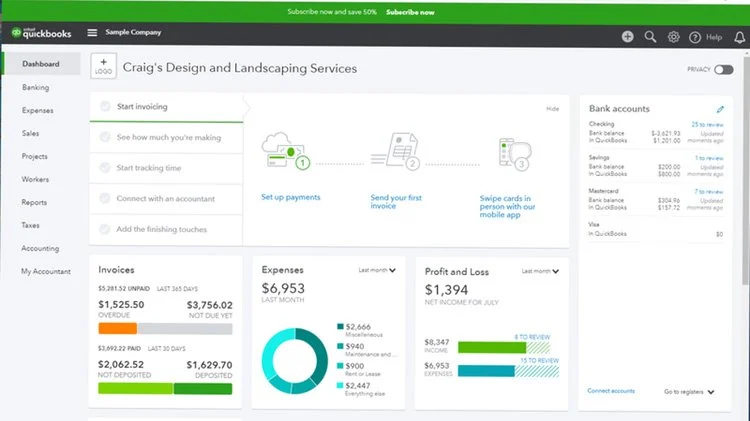Making the Choice: QuickBooks Online or QuickBooks Desktop – Which Is Best for You
Unlocking the Potential: QuickBooks Online vs. QuickBooks Desktop for Your Business
Choosing the right accounting software for your business is a pivotal decision that can significantly impact your financial management and overall efficiency. In the world of financial software, QuickBooks stands out as a top choice, but with several different platforms available, how do you know which one is the best fit for your unique business needs? In this blog, we'll explore the QuickBooks Online Vs. Desktop platforms and help you make an informed decision about which one suits your business requirements like a glove.
The QuickBooks family of accounting software is renowned for its versatility and ability to cater to a wide range of business needs. Whether you're a solopreneur, a mid-sized company, or a large corporation, there's a QuickBooks platform designed to streamline your financial processes. However, the QuickBooks ecosystem has evolved, offering several specialized platforms tailored to different business needs. Are you a freelancer, a small business owner, or a larger enterprise? Do you need basic bookkeeping or advanced inventory management? Let’s Figure out what product best suits your needs!
QuickBooks is a powerful accounting software platform that offers both online & desktop versions, each with its own set of features and advantages. We'll explore the key differences between QuickBooks Online and QuickBooks Desktop to help you make an informed choice for your business.
1) Accessibility & Mobility:
QuickBooks Online: As the name suggests, QuickBooks Online is a cloud-based solution accessible from any device with an internet connection. This makes it highly convenient for business owners who need to access their financial data on the go or collaborate with remote teams.
QuickBooks Desktop: QuickBooks Desktop is installed locally on your computer and requires you to work from the same device where the software is installed. While this can provide a sense of security, it lacks the flexibility of remote access that QuickBooks Online offers.
Updates and Maintenance:
2) Updates & Maintenance:
QuickBooks Online: With QuickBooks Online, updates and maintenance are managed by Intuit, the company behind QuickBooks. This means you don't have to worry about manually installing updates, and you always have access to the latest features and bug fixes.
QuickBooks Desktop: QuickBooks Desktop requires regular manual updates and maintenance. You'll need to purchase new versions when they are released to access the latest features, and you're responsible for keeping your data secure and backed up.
3) Cost:
QuickBooks Desktop remains a favorite among small business owners. QuickBooks Desktop is an affordably priced, easy-to-use application that is ideal for both small and growing businesses.
· Pro: $399.99
· Premier: $649.99
· Enterprise: $1,213
· Affordably priced
· Multiple plans offer easy scalability
· Intuitive system navigation
QuickBooks Online is the browser-based version of the popular desktop accounting application. It has extensive reporting functions, multi-user plans (for up to 25 users) and an intuitive interface.
· Self-Employed: $15
· Simple Start: $30
· Essentials: $55
· Plus: $85
· Advanced: $200
· Plans available for up to 25 users
· Excellent reporting capability
· Intuitive design
QuickBooks Online: QuickBooks Online typically operates on a subscription model, with monthly or annual fees. The pricing varies based on the plan you choose and the number of users you need, making it flexible for businesses of different sizes.
QuickBooks Desktop: QuickBooks Desktop was a one-time purchase, but Inuit has changed this to a monthly fee unless you have an older version than 2023. Inuit no longer supports older versions as they are moving away from the desktop platform. You'll need to still upgrade to a new version periodically to access the latest features and maintain compatibility with operating systems. This can result in higher upfront costs over time.
1) Features and Customization:
QuickBooks Online: QuickBooks Online offers a broad range of features suitable for many businesses. It's known for its ease of use and provides tools for invoicing, expense tracking, inventory management, and more. While it has robust features, some advanced customization options may be limited compared to QuickBooks Desktop.
QuickBooks Desktop: QuickBooks Desktop offers more advanced features and customization options, making it suitable for industries with complex accounting needs, such as manufacturing and construction. It allows for greater control over your data and reports.
2) Multi-User Access:
QuickBooks Online: QuickBooks Online supports multiple users based on your subscription plan, allowing for collaborative work and real-time data sharing. It permits your Pro Advisor/Accountant to login remotely and help with any issuses you maybe having. For example, You are unable to get your bank account to balance & need help, your Pro advisor would be able to login & get things back in balance!
QuickBooks Desktop: QuickBooks Desktop also supports multi-user access, but it requires additional licenses and setup of a server to enable collaboration. This can be tricky if each user is not using the same system and versions.
QuickBooks Online Look
QuickBooks Desktop Look
Both versions offer such things as:
Chart of Accounts: Create and manage a chart of accounts to categorize income, expenses, and assets.
Bank Reconciliation: Reconcile bank and credit card accounts to ensure accuracy.
Create Invoices: Generate professional invoices and estimates for clients.
Payment Processing: Accept online payments from customers through various payment gateways. (I will be speaking on various Apps that work hand in hand with Quickbooks in a future blog)
Expense Tracking: Record and categorize business expenses, including receipts and bills.
Expense Reporting: Generate expense reports to analyze spending patterns.
Financial Statements: Create and customize income statements, balance sheets, and cash flow statements.
Budgeting: Set up and track budgets to monitor financial goals.
Inventory Tracking: Monitor stock levels, manage purchase orders, and track cost of goods sold.
Payroll Processing: (Additional Subscription for both)
Payroll Management: Run payroll, manage employee profiles, and calculate payroll taxes.
Third-Party Integrations: Connect with various business apps and services to expand functionality. (I will be speaking on various Apps that work hand in hand with Quickbooks in a future blog)
Sales Tax: Track, calculate, and report sales tax.
Mileage Deductions: Track and calculate mileage for tax deductions.
In the ever-evolving landscape of accounting software, choosing between QuickBooks Online and QuickBooks Desktop can be a critical decision for your business. QuickBooks Online offers accessibility and mobility, making it an ideal choice for those who need the flexibility of remote access and collaboration with teams from anywhere. On the other hand, QuickBooks Desktop excels in advanced features and customization, catering to industries with complex accounting needs. It provides greater control over data and reports. Understanding your business's unique requirements, accessibility preferences, and budget constraints will guide you to the right QuickBooks solution.
Your journey to selecting the perfect QuickBooks platform for your business doesn't have to be a solo endeavor. I'm here to lend a helping hand in navigating the intricacies of QuickBooks Online & QuickBooks Desktop. Making the right choice is crucial for your financial efficiency and success, and I'm committed to assisting you every step of the way. If you're unsure which QuickBooks solution aligns with your business goals, please don't hesitate to contact me. I'm eager to discuss your unique requirements, offer personalized recommendations, and ensure that you make the best decision to optimize your financial management processes.
PS: Stay tunned for what Apps work well with QuickBooks!






